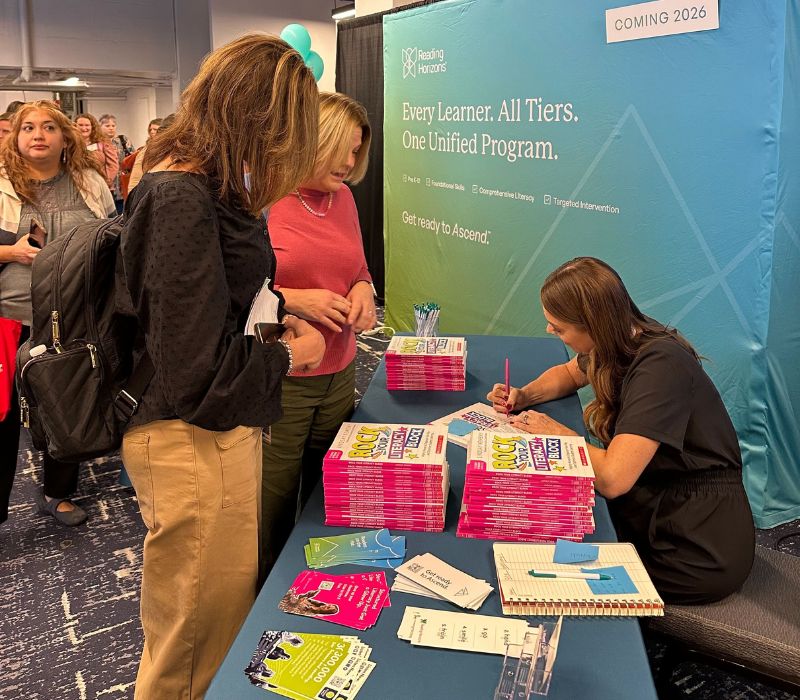By Stacy Hurst, Donell Pons & Lindsay Kemeny
Why This Conference Mattered
We spent three inspiring days at the Reading League Conference in Chicago, surrounded by passionate educators and researchers focused on evidence-aligned reading instruction. This event not only recharged our commitment to literacy but also provided us with fresh tools, perspectives, and practices to bring back to our classrooms and communities.
Major Themes That Emerged
Evidence-Aligned Instruction
The conference reaffirmed that the science of reading isn’t just theory—it’s a research-backed approach that must be woven into daily practice. We were reminded how essential it is to bridge research and instruction, and how powerful it is when teachers are equipped with the knowledge to do so.
Explicit Instruction and Foundational Skills
Session after session emphasized the importance of explicit teaching and intentional scaffolding. From phonemic awareness to word recognition, we walked away with new ideas for strengthening foundational skills through structured routines and modeling.
Reading and Writing Integration
One of the most energizing insights was the growing focus on integrating writing into literacy instruction. Presenters shared strategies for embedding sentence work, paragraph construction, and writing tasks across grade levels in ways that support reading comprehension and language development.
Supporting Multilingual Learners
We attended several sessions centered on building inclusive, asset-based classrooms for multilingual learners. The focus on translanguaging, linguistic diversity, and intentional instructional supports was both timely and essential.
AI and the Future of Literacy Instruction
The conversations about AI in education were balanced and thought-provoking. While we explored new possibilities for using AI tools to support instruction, the clear consensus was that human relationships and teacher judgment must remain central.
Practical Takeaways We’re Applying
- We’re rethinking our literacy blocks to create more time for orthographic mapping, decoding practice, and writing fluency.
- We’re embedding sentence-level instruction into meaningful writing activities, not as isolated grammar drills.
- We’re creating space to understand and support students’ working memory needs more intentionally.
- We’re piloting digital tools with purpose, using instructional goals—not tech trends—as our guide.
- We’re revisiting how we design instruction for multilingual learners to ensure language development and literacy grow side by side.
A Moment We’ll Never Forget
One personal highlight was Lindsay’s book signing at the Reading Horizons booth. The energy, support, and excitement from fellow educators was unforgettable. We’re grateful to Reading Horizons for making that event possible and for being such a strong supporter of teachers and evidence-based literacy practices.

Suggestions for Your Team
- Use one breakout session as a team study topic for a PD meeting.
- Revisit your daily schedule and look for opportunities to strengthen explicit instruction.
- Reflect on how you’re currently integrating writing into reading instruction.
- Ask: Are our multilingual learners visible in our planning and practices?
- Explore how cognitive load and working memory affect student performance—and how we can help.
Final Thoughts
The Reading League Conference 2025 was more than a professional event—it was a catalyst. We left inspired, reflective, and ready to continue growing. Literacy is complex, but the research is clear. With knowledge, collaboration, and intentional planning, we can transform outcomes for every student.
The Reading League 2025 Conference Resources List
- Resources page, The Reading League – A comprehensive hub of evidence‑aligned reading instruction webinars, books, and professional‑development materials: https://www.thereadingleague.org/resources/
- Conference Agenda (2025) – Full PDF of breakout session titles and descriptions from the October 8‑10 (Chicago) conference, offering insight into the breadth of content: https://www.thereadingleague.org/wp-content/uploads/2025/03/the_reading_league_conference_agenda_2025.pdf
- Online Academy, The Reading League – Self‑paced / live virtual course catalog on foundational topics like phonemic awareness, morphology, dyslexia, and writing‑instruction alignment: https://www.thereadingleague.org/online-academy/
- Live Events Library, The Reading League – On‑demand webinars and videos of past symposiums, which make for excellent follow‑up or professional learning team viewing: https://thereadingleague.uscreen.io/
- “What Is the Science of Reading?” – The Reading League’s defining guide – A free resource that outlines the research base behind evidence‑aligned reading instruction: https://www.thereadingleague.org/
- Curriculum Evaluation Guidelines – A tool included in the Resources page that helps teams evaluate whether a reading curriculum aligns with the science of reading research: https://www.thereadingleague.org/resources/
- “Beyond the Hype: The Opportunities and Limitations of AI in Structured Literacy” session – Part of the Conference agenda. Valuable for planning how AI fits (and doesn’t) in structured literacy. Note: The PDF agenda lists this as a session.
- “Writing Development and Instruction for Multilingual Students” session – Also listed in the agenda. Emphasizes integration of writing + multilingual learner asset‑based instruction.
- “Making Words Stick: The What, Why, and How of Orthographic Mapping” session – From the Conference agenda, useful for deep word‑study and orthographic mapping planning.
- Chapter Network & State Chapters – The Reading League – Support network of U.S. state‑based chapters that share events, book‑studies, and collaborative professional learning: https://www.thereadingleague.org/chapter/

